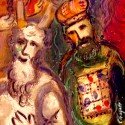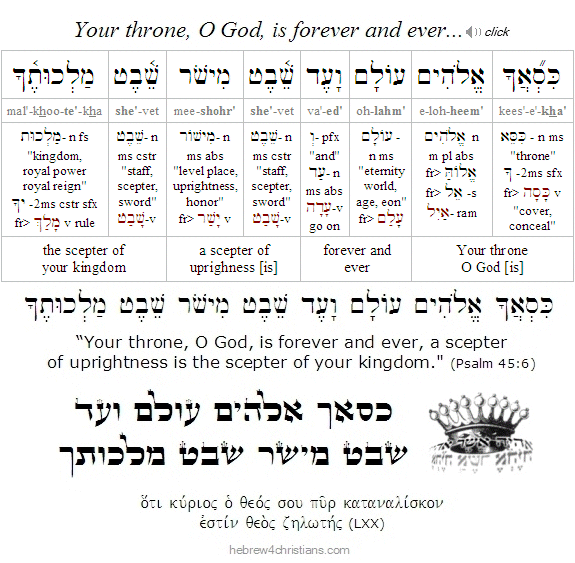|
This week's Torah begins with Korach and 250 leaders of Israel confronting Moses and Aaron in the wilderness saying, "You have gone too far! (רַב־לָכֶם, lit., "(too) much for you!")... Why do you raise yourselves above the congregation of the LORD?"
Recall that Korach was the blood cousin of Moses who reasoned that he should be the head of the Levite clan. After all, Moses was given leadership of Israel at large, and Aaron was given the leadership of the priesthood, so why shouldn't he likewise be honored in Israel? Korach's co-conspirators were two brothers named Dathan and Abiram from the tribe of Reuben, Israel's firstborn son. Since traditionally the firstborn son obtained the leadership of the people, these tribal leaders would have sympathized with Korach and also resented Moses' leadership of Israel.
According to rabbinical tradition, Dathan and Abiram might have been the leading conspirators against Moses, since they had a long history of opposing him. They had been the ones who reported Moses' murder of the Egyptian which caused him to flee to Midian; they were said to have partook of the manna on the seventh day after the Exodus -- defying Moses' direct orders; and they were the ones who issued the rebellious cry in the camp saying, "Let us choose a leader and return to Egypt" (Num. 14:3-4). When Moses later appealed to them to desist from their rebellion with Korach, they answered insolently: "Is it a small thing that you have brought us up out of a land of milk and honey to kill us in the wilderness?" (Num. 16:13). Note how these men, presumably once wealthy and successful in the land of Egypt, now referred to it as "a land flowing with milk and honey" -- the very words Moses had used to describe the Promised Land! For those who love this world, the ideal of the "Promised Land" always seems like "pie-in-the-sky," and the struggle to walk by faith seems like downright torture...
Korach was certainly in collusion with Dathan and Abiram in this grave rebellion. The sages regard his name (קרַח) as an acronym formed from the three words קִנְאָה (jealously), רוֹמְמוּת (exaltedness), and חָמַד (coveting/desire). Korach was jealous of his cousin's status; he sought for personal honor; and he coveted power of which he was not worthy. Ironically, his "dispute" with Moses (and Aaron) hinged on what he regarded as Moses' self-exaltation: "Why do you lift yourselves up above the assembly of the LORD" (Num. 16:3). Since we know that the Torah describes Moses as a man of consummate humility (Num. 12:3), Korach's accusation was the height of hypocrisy -- charging him with the very sin of which he was guilty. (As an aside, isn't it typical of human nature to project our faults on others -- to ascribe our own shortcomings and defects as if they existed in others?)
We know how the story ended for Korach and his rebellious followers. Pirke Avot 4:21 says, "Jealousy, desire, and the quest for personal honor removes an individual from the world." This was clearly evidenced when the earth "swallowed" the rebels alive. Nonetheless, even after witnessing the terrifying judgment of God, the Israelites still complained that the first born had been rejected in favor of the Levites.
As a final test to vindicate Aaron as God's exclusively chosen priest, each of the twelve tribal heads of Israel, as well as Aaron himself, were instructed to bring their staffs to Moses. Moses then inscribed their names on each staff and brought them into the sanctuary before the Ark of the testimony. "And the staff of the man whom I choose shall sprout. Thus I will make to cease from me the grumblings of the people of Israel, which they grumble against you."
The following day Moses went into the Mishkan (Tabernacle) and "behold, the staff of Aaron (מַטֵּה־אַהֲרן) for the house of Levi had sprouted and put forth buds and produced blossoms, and it bore ripe almonds." He then brought out all the staffs and gave them back to each of the tribal leaders. The LORD then told Moses to return Aaron's staff to the Mishkan as a memorial and testimony for generations to come.

Just as God exclusively chose Aaron to minister before Him, so Yeshua was the exclusively chosen to be the greater High Priest of the New Covenant. Regarding His priesthood "after the order of Malki-Tzedek," the author of Book of Hebrews wrote: "No one takes this honor for himself, but only when called by God, just as Aaron was" (Heb. 5:4). And just as Aaron's lifeless rod miraculously brought forth life, Yeshua's cross -- likewise made of wood -- also "budded and produced blossoms" after His resurrection from the dead. Yeshua went into the sanctuary made without hands and there offered his blood to procure for us an everlasting atonement. His sacrifice as our High Priest gives us life from the dead! Under the terms of the Sinai covenant, "Aaron's rod" was a picture of God's authority and judgment, just the Messiah's cross and resurrection vindicates God's exclusive choice of Yeshua as our Mediator before God. Those who reject His choice will ultimately share the same fate as those who partook of Korach's rebellion (Jude 1:11).
Hebrew Lesson
Pslam 45:6 reading (click):
 |
|




